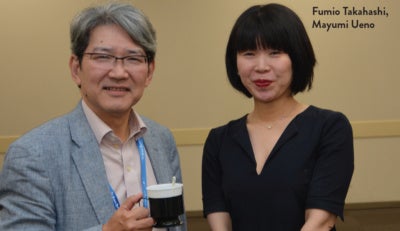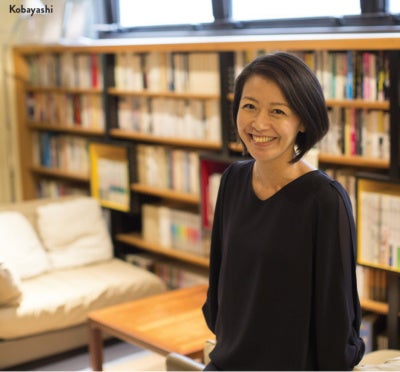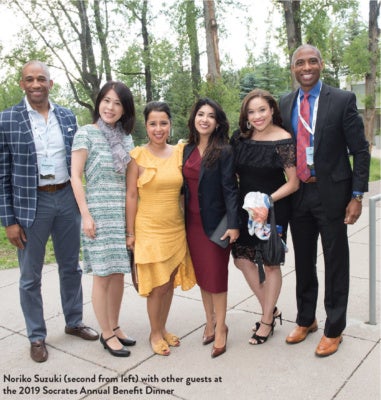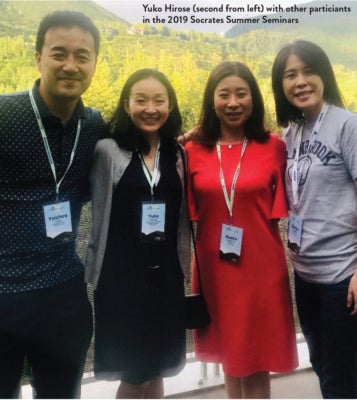As a way of honoring the legacy and contributions of Yotaro “Tony” Kobayashi, the founder of Aspen Institute Japan, in 2016 Trustee Emeritus Leonard Lauder and Kobayashi’s widow funded a series of English-language Socrates seminars in Japan.
The goal of this effort was twofold: to provide emerging leaders in Japanese cities an opportunity to challenge, contemplate, and engage their peers via the time-tested Socrates seminar models; and to provide funding for Japanese leaders to join Socrates seminars all over the world. To date, 100 Japanese leaders have engaged in Socrates seminars organized by the Aspen Institute Japan in Tokyo, Nara, and Otsu, and 24 Kobayashi scholars have joined Socrates in Aspen, Colombia, Ukraine, Spain, France, Romania, and Mexico.
One of the stated goals of the Socrates Program is inclusivity. The Institute always strives to “curate the room” so the seminar participants reflect the incredibly diverse world they live in. Japanese corporate culture, as in every other developed nation, is grappling with gender issues. Socrates seminars, which strive for gender balance, have contributed to gender equity efforts already underway. Moreover, as the Socrates Program has grown and engages its alumni in Japan, a strong and active group of Japanese female leaders has emerged—and those leaders have replicated their Socrates experience and contributed to the global Aspen community.
These four leaders are some of the brightest stars in our global constellation. They exemplify the “why” of the Institute’s work.

Mayumi Ueno
It was March 2018 when a friend of mine, an alum of the Socrates Program, called me. She asked if I was interested in an upcoming seminar, “Unlocking the Potential of Artificial Intelligence,” organized by the Aspen Institute in May 2018. I jumped at her offer, as I had coincidentally just started my own study of AI.
As a practitioner of development work and humanitarian assistance, I am always keen to learn innovative ideas and solutions that can improve the lives and well-being of the world’s most vulnerable populations in the least developed countries. Above all, my passion is to advance gender equality and empowerment of women and girls. Through eight years of field work in Africa, including a deployment to Somalia, my intellectual curiosity was particularly drawn to the potential use of the most advanced technologies to benefit marginalized and isolated populations.
I sensed that the Socrates seminar was an ideal opportunity—and the experience was more than I expected. It was intensive, rich, and eye-opening. Adding to the quality of the seminar was the reading packet, which was mailed to the participants one month ahead of the seminar and though rich in volume still digestible to a full-time employee like me. The moderator of the Socrates seminar was superb as well: Wilson White, the director of public policy and government relations at Google, brought tactful facilitation skills, technical expertise, and candid comments and insights.
In the seminar room and beyond, I sensed the embedded spirit of “no one left behind.” The participants included people from the business sector, NGO professionals, and a member of parliament; we enjoyed hearing different perspectives and insights from our peers. Their comments and perspectives shed light on my blind spots and helped me think outside the box.
That is what makes Socrates so special. We can all get abreast of the latest on the development of AI, or whatever subject, by simply reading papers and books. We can even acquire the knowledge quickly by attending seminars. But what I appreciate most about the Socrates Program is its respect for humanity.

Naho Kobayashi
Have you ever thought about how difficult it is for adults to form friendships without business or a common interest? There are many places and chances to meet new people, such as joining a new project or company, going to a co-working space, or at the bar or gym. When we meet in these spaces, however, it takes a long time for relationships to grow until we trust each other well enough to have discussions that touch on deeper philosophical and ethical issues.
This was the most surprising thing I experienced at the Aspen Socrates Tokyo Seminar in Japan. It gave me a chance to have deep dialogue with 18 strangers with a wide variety of backgrounds, including the CEO of an IT start-up, a politician, a business manager, an independent consultant, and a leader at a nonprofit. In three short days, they became my trusted friends.
We still meet often and continue the discussions we began around the seminar table. Being able to speak freely without the ulterior motives of business or profit and loss allows us to see issues more clearly and get to the heart of the topic. In addition, I often receive inquiries from the Socrates alumni network, the more than 7,000 members who have participated in Socrates programs held around the world. When one alum, an investor researching workstyle reform in Japan, came to Tokyo, I set up an interview for him with activists he wanted to meet. Another alum, who is a faculty member at American University, invited me to pitch for a joint US-Japan art program. It is possible to gain new collaborators and colleagues based on the trust that comes from the shared experience of the Socrates Program.

Noriko Suzuki
The Socrates seminar lasts for only three days, but I will never forget the experience. I truly embraced stepping out of my comfort zone. At the seminar in Nara, Japan, two years ago, I enjoyed in-depth discussions about technology and democracy, moderated by Charlie Firestone. At the table were the brightest minds from Japan’s government and private sectors as well as from overseas. During the seminar, I had an opportunity to analyze and discuss technology’s impact on democratic society and politics. The experience gave me a new perspective on my work, and has made me a better leader helping to serve customers and the community.
Last summer, I attended another Socrates seminar, this time in Aspen, Colorado. How was the Aspen seminar different from Nara? Overwhelmingly American. People were willing to share their experiences and views from the very beginning. One participant spoke about his grandparents’ immigration and their ensuing struggles—a stark contrast to the Nara seminar, where most participants were Japanese and far more reserved. Japanese people rarely ask, “What do you think?” or “What is your opinion?” Society expects us to “read the air,” to try to guess what the collective opinion of the group is and conform to it. The two Socrates seminars provided me with a safe and encouraging environment to have a voice—and also a rare chance to listen to other people’s sincere comments.

Yuko Hirose
When I attended “Unlocking the Potential of Artificial Intelligence” in Tokyo as a Kobayashi scholar, my eyes were opened: simply changing the language to English and using the Socratic method encouraged normally quiet Japanese professionals to share their views and opinions more openly.
I later moved to New York to start working at the United Nations Development Programme’s Crisis Bureau and was fortunate to join a Socrates seminar on “Learning from Lincoln.” This experience enabled me to meet leaders who were creating local change at the city or district level at a time when leadership at the federal level embodied values that were different from theirs. The array of participants was incredibly diverse, as were the viewpoints shared—exposing me to ideas and interpretations I would likely not have discovered in Tokyo. The inspiration of Lincoln’s ability to bring people together even in a “house divided” has been critical to my work supporting countries in crisis, such as Syria and Yemen.
Now, more than ever, we need the Aspen community and its values to come together as the world fights a global pandemic. Working on the Covid-19 response at UNDP, I often think of the inspiring leaders I met through the Socrates Program—whether I am thinking through how to use AI as an early warning system to predict possible Covid outbreaks or brainstorming how I can better craft messaging to ensure migrants, refugees, and other vulnerable populations are included in the government’s response and recovery plans. I look forward to continuing to be part of this vibrant community.